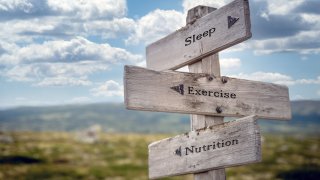

The following content is created in consultation with Mancini's Sleepworld. It does not reflect the work or opinions of NBC Bay Area editorial staff. To learn more about Mancini's Sleepworld, visit Sleepworld.com.
We all know that regular exercise and a balanced diet can lead to improvements in our overall quality of life. But have you ever thought about the impact diet and exercise have on your sleep? More than a third of American adults don’t get enough sleep on a regular basis, leading to an increased risk in developing chronic conditions including high blood pressure, heart disease, stroke, obesity, and diabetes.
The good news is that there are a few practical and non-medical steps those who struggle with sleep can take. A study by the National Institute of Health suggests that cardiovascular exercise can be an effective strategy for improving sleep in adults who struggle with insomnia.
Get a weekly recap of the latest San Francisco Bay Area housing news. Sign up for NBC Bay Area’s Housing Deconstructed newsletter.
In a nutshell, even a short workout has the ability to increase and then decrease your body temperature, improving the quality of your sleep. Also, some symptoms of insomnia can be reduced from exercise through the release of endorphins and increase in serotonin and dopamine levels, making you feel less tired. Finally, exercise can shift your circadian rhythm, helping you wake up in the morning and fall asleep at night.
There are also some dietary guidelines that can impact your sleep, the most obvious being avoiding caffeine and alcohol. If you can’t go without your daily cup o’ Joe, you should at least try to stay away from caffeinated products within the eight hours before you plan to go to bed. Similarly, a nice glass of wine before bed may make us feel drowsy, but it actually reduces REM (rapid eye movement) sleep, without which we are more likely to wake up feeling fatigued.
Additionally, spicy or fatty foods should be avoided before bed. These foods cause indigestion and heartburn, which can make it more difficult for our bodies to relax before bedtime. On the other hand, foods that naturally contain tryptophan—the amino acid that makes up melatonin and serotonin—such as cheese, almonds, pumpkin seeds, asparagus, and olives can help you have a better sleep. It turns out moms were right all along: the tryptophan found in a warm glass of milk can help you fall asleep.
Lastly, no good night of sleep can be complete without a good mattress. If you’re waking up feeling achy and sore, it may be time to start looking into a new mattress.
Visit Mancini’s Sleepworld, where experts can help you find the best high-quality mattress to get your best night of sleep.


